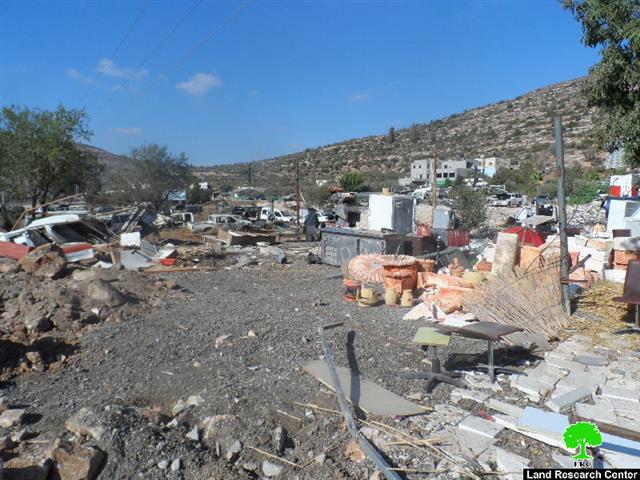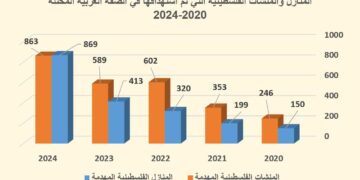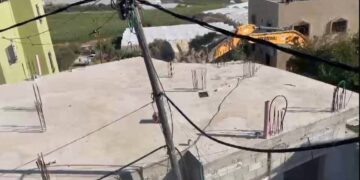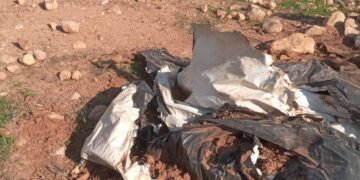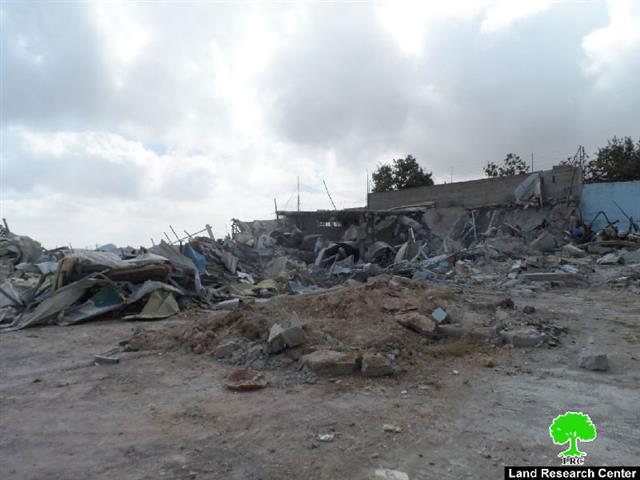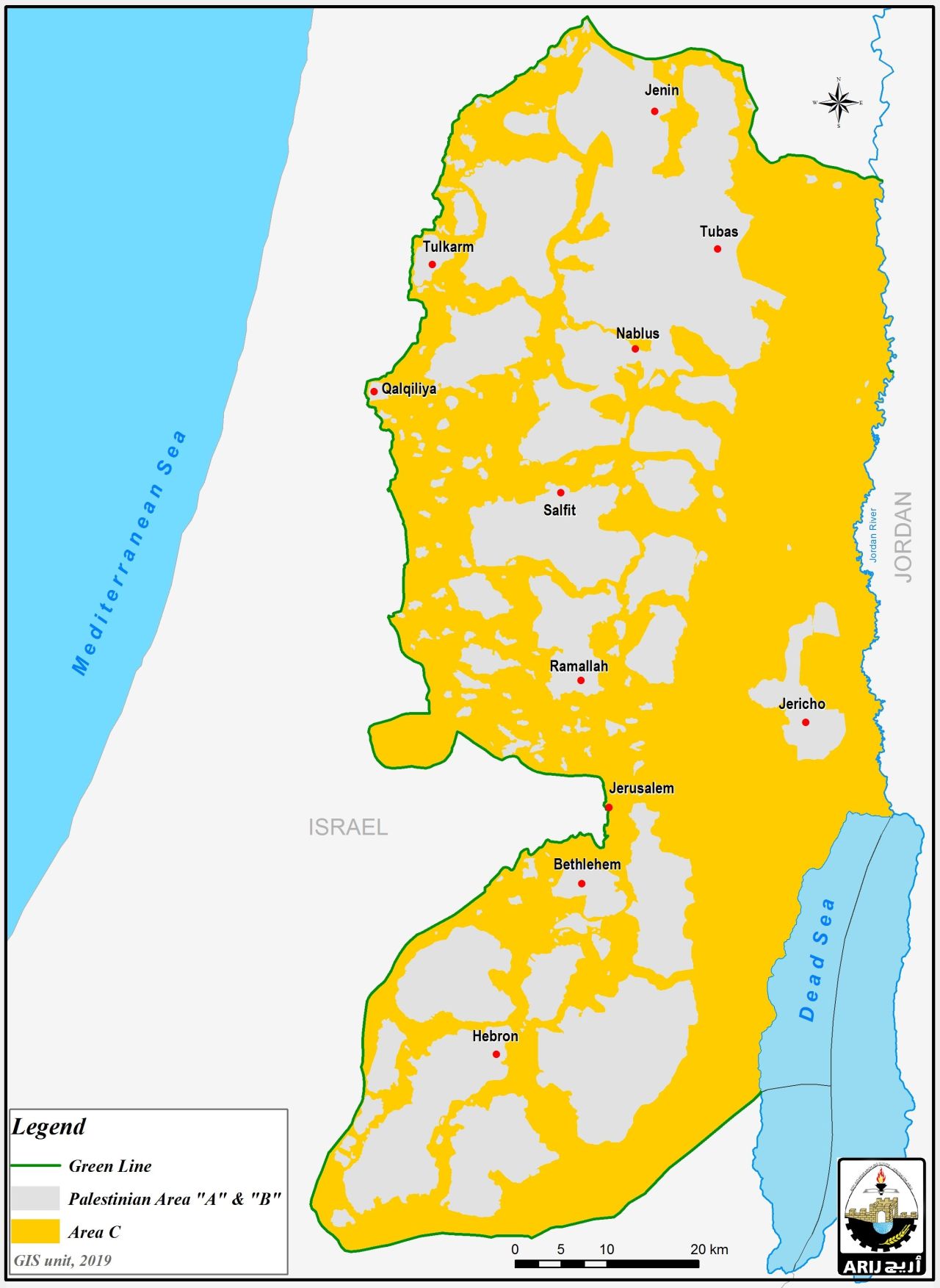Violation: destroying two workshops and a carwash
Location: al-Lubban al-Sharki/ Nablus governorate
Date: 02/09/2014
Perpetrators: the Planning committee of the occupation
Victims: two families( 12members including 7 minors)
Details:
At dawn of Tuesday 02/09/2014, the troops of the occupation destroyed two industrial workshops in addition to a carwash in the eastern part of the al-Lubban al-Sharki ,which aligns with the bypass road no.60. The following table shows the inflected damages according the field follow-up of Land Research Center LRC :
|
Citizen |
Family |
Minors |
Area/m2 |
Structure |
Notes |
Photo |
|
Raja Daraghmeih |
5 |
3 |
32 |
Handmade crafts shop and a mini-market |
Demolished for the sixth time since2002 |
|
|
Majed Daraghmeih |
7 |
4 |
20 |
Carwash |
demolished for the sixth time since2002 |
|
|
Majed Daraghmeih |
|
|
12 |
Mechanic workshop |
demolished for the sixth time since2002 |
|
|
Total |
12 |
7 |
64 |
|
|
|
Source: field observation _ Monitoring Israeli Violations_ Land Research Center LRC
It should be mentioned that the affected structures have been demolished about six times under the pretext of unlicensed construction three of which took place in August of 2013 and January and September 2014. Noteworthy, the latest demolition was undertaken without any previous notification andor orders.
The workshops were the only source of income for the two targeted families. Raja Daraghmieh(34) to the LRC researcher stated that: "despite the frequent targeting on our only source of living, we insist on staying here for there is no other job to work in. We lost our jobs in the areas separated by the Green Line(the cross point between Israel and the West Bank) in 2000 and the occupation is following us now to our houses".
Raja wondered what kind of threat those workshops would have affected the Israeli security since they were made of bricks and metal slabs.
About al-Lubban al-Sharkia:
It is located 20km southwest of Nablus governorate. The village is surrounded by a number of towns and communities namely( al-Sawiya, Qaryut, Ammoriya, Yasuf, Singel, Abouyn, Salfit and Iskaka)
The village has a total land area of 12,075 of which 150 dunums is a built -up area. 240 dunums are considered agricultural lands for grains and vegetables plantation where another 700 dunums have been a subject to colonial activities. The bypass road no.60 confiscated around 200 dumums where the rest of the land total area is planted with olive, almond and figs. (source: geographical information system GIS -LRC)
Awaysa and Daraghmeh clans are the two main families in the village where the population totals around 2900 people. The unemployment rate is around 51% due to closures, sieges, and lands confiscation. Only 14% of the residents are employed in different sectors such like the governmental and the private ones. Others depend on plantation as a source of living.( source: the town's village council).
Land Research Center LRC sees that the demolitions contradict with all the International conventions and Humanitarian laws including:
Article 17 of the (1948) Universal Declaration of Human Rights stating: “Everyone has the right to own property alone as well as in association with others. No one shall be arbitrarily deprived of his property.”
Section ‹G› of article 23 of the (1907) The Hague Conventions asserting: “In addition to the prohibitions provided by special Conventions, it is especially forbidden to destroy or seize the enemy's property, unless such destruction or seizure be imperatively demanded by the necessities of war.”
Article 53 of the Geneva Fourth Convention (1948) declaring: “Any destruction by the Occupying Power of real or personal property belonging individually or collectively to private persons, or to the State, or to other public authorities, or to social or cooperative organizations, is prohibited, except where such destruction is rendered absolutely necessary by military operations.”
Section 1, Article 11 of the International Covenant on Economic, Social and Cultural Rights (1966): “The States Parties to the present Covenant recognize the right of everyone to an adequate standard of living for himself and his family, including adequate food, clothing and housing, and to the continuous improvement of living conditions. The States Parties will take appropriate steps to ensure the realization of this right, recognizing to this effect the essential importance of international co-operation based on free consent."
Prepared by
The Land Research Center
LRC

